A Weekend of Woo (Or why I love the Esalen Institute)
For the forth time in my life I journeyed north on Pacific Coast Highway along the ragged California coast line north of San Simeon and the Hearst Castle where the road turns twisty and the cliffs bend vertical. The Esalen Institute is nestled on the ocean side of the highway atop some bluffs dotted with buildings that include yoga rooms, Yurts, Spartan housing overlooking the ocean, a soup kitchen-like cafeteria serving spectacularly healthy food (lots of Tofu and veggies, no tri-tips or ribs), and workshops catering to just about every belief ever investigated and found wanting in the pages of Skeptic magazine.
Nevertheless, I loved my time there once again, not only for the breathtaking scenery and unprecedented views, or the invigorating cycling and hiking, or the natural hot springs pouring out of the mountain and into elegantly designed hot tubs (clothing optional, and most opt to go without), but for the apparent incongruity made congruous when we consider our mission as skeptics to take our message of science and critical thinking to those who need to hear it most.
My workshop was entitled “Science, Spirituality, and the Search for Morality and Meaning.” First, I must say that the 24 participants in my workshop were already as skeptical as one might find at one of our Sunday Caltech lecture series meetings and dinners. All were well-read in the sciences and humanities to the point that I learned as much as I taught, and the ensuing conversations both during and after the lectures, along with at the meals, were exceptional.
Thus, I needed to trek down to the hot tubs in order to really sample the population of attendees at other workshops that weekend. What I heard was most entertaining, as well as educational in terms of why people believe weird things. To be fair, the workshop on couples massage sounded thoroughly grounded in the reality of how relaxing it can be to give and receive a massage, and I have no doubt that the couples in this class were probably brought closer to one another and learned a skill they could definitely take home with them.
But there were other workshops that sounded more like the touchy feely without the touchy. This goes by the generic descriptor of “energy work.” Lots of hot tub soakers waxed enthusiastic about getting their chakras adjusted, their Chi energy re-energized, the miracles of acupuncture, acupressure, and Chiropractic, and how this and that “natural healer” could cure everything from migraines and depression to pain and bowel ailments.
(A note parenthetical on the clothing-optional hot tubs: if you’ve never opted as such it probably sounds either positively off-putting or on-turning, depending on your imagination. It is neither. It is nothing, in fact. No one cares or stares. It actually does seem natural and normal in that environment. At night it’s pretty dark so you can’t really see anything anyway, and during the day people are discrete and polite. It’s all cool.)
If there is one work that best captures how people think (or miss-think) at Esalen it is “anecdotal.” Everything is couched in anecdotes. “I tried this” — “This worked for me” — “I know someone who said he used X for his headache” — “Ever since I started doing X my headaches have disappeared” and so on. No one ever discusses studies, experiments, control v. experimental groups, epidemiological studies, and the like. I heard one guy in the hot tub proclaim “I’m a skeptic, a man of science,” which was followed by a litany of anecdotes about the amazing wonders of this acupuncturist he’s been going to. Revealingly, someone asked him if the needles hurt. He pronounced without hesitation that the needles never ever hurt. And yet five minutes later he confessed that the ones in his hand, wrist, forearm, and shins all hurt like hell.
The problem with anecdotes is that 10 anecdotes are no better than 1, and 100 anecdotes are no better than 10. As I’ve repeated numerous times in numerous books and articles, “anecdotes do not make a science.” Or as a new trope going around these days (the source of which escapes me), “the plural of anecdote is not data.” (Who first said that? Anyone? Anyone? Bueller?) Anecdotes are fun and interesting, and they may even lead one to construct an experiment to test a hypothesis (“does sitting naked in a natural hot spring tub lead to anecdotal thinking?”), but by themselves they are often worse than nothing because they lead one to draw conclusions that are more often than not misleading or wrong.
Thus it is that in one of my hot tub sessions I brought up the famous 1990’s “Emily experiment,” in which little Emily Rosa, for her 4th grade science project, tested Therapeutic Touch (TT, or the original touchy feeling without the touchy) by observing under controlled conditions if this “healers” could even detect her “energy field” behind an opaque screen in which they slid their hands through two cut out openings at the bottom. Emily flipped a coin to determine whether she would hold her hand a few inches above the TT therapist’s left or right hand, at which point they had to declare which hand detected the energy field. As a simple coin-flip model it’s a 50/50 guess. Emily’s subjects scored less than 50%, worse than chance, even though before the experiment began they all declared that they could with 100% certainty detect her energy field standing before her. After I recounted this experiment the other people in the tub said something to the effect of “um,” and “oh, uh, okay,” and “well…uh…um.” I have no idea, of course, if they went back to their rooms and revisited their deepest held beliefs about human “energy,” but I hope to have planted a small seed that may one day grow into a skeptical tree. Who knows?
Since so much of the Esalen Institute is experiential, I’ll let my iPhone pics speak louder than my words for what it was like experiencing Esalen, one of my favorite places on the planet. (Click any image to enlarge it and view the entire image gallery.)

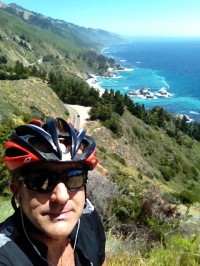
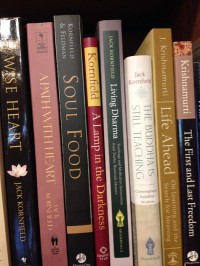
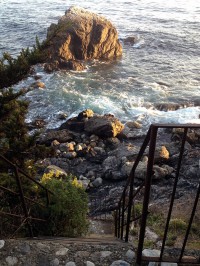
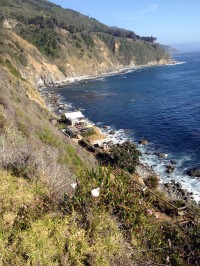
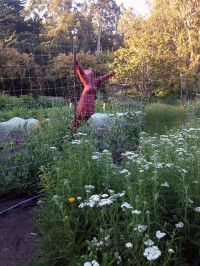
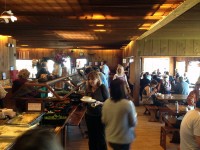
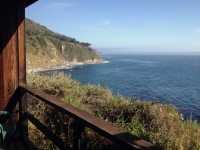
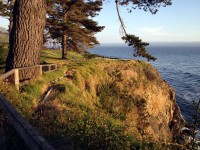
100 anecdotes are better than 10, and they are data. You can put them in a database and maybe even do a case-control study.
How can you do any control, if all you have are the anecdotes? Thats the point — they’re self-selected, and therefore useless as data. As soon as you have any control they’re not anecdotal anymore.
Use homeopathy anecdotes as placebo controls ;-)
Without placebo, you can still compare treatment X to treatment Y.
If the results are dramatic, you may not need controls. See the famous systematic review of parachutes.
http://www.ncbi.nlm.nih.gov/pubmed/14684649
I bet you wouldn’t bat an eye if someone asks whether getting a tattoo or a piercing hurt, but asking whether acupuncture hurt, that’s unscientific.
+Scott
Beware: *all* data is subject to selection effecst (e.g. why were the first 100 extrasolar planets discovered dominated by ‘Hot Jupiters’? Because the properties of Hot Jupiters make then easy to find first). The trick is to be mindful of such things when interpreting the data.
As a researcher who focuses on data analysis and interpretation, I am always dismayed that even among skeptics there is an attitude that ‘data analysis is data analysis’ – it’s a one-size-fits-all technique. T’aint so! Maybe it looks that way because in High School science labs we have kids make measurements, calculate errors, and then compare with predicted results over and over again. I can assure you that oft times the analysis is far more involved than that – and it is amazing the type of information one can extract from clever ‘data mining’ (and why so called ‘anonymized data’ is a dangerous thing to post online)
As long as the anecdotal evidence is of sufficient quality it can be used to draw inferences… in truth *all* data can be used to draw inferences, but the strength of the inference depends on the quality of the data. Also, the details of the data will restrict the type of inferences drawn.
Also, not all analysis requires a control group – what is the control group for the Big Bang?
“Emily’s subjects scored less than 50%, worse than chance”
0% on a true/false test would’ve been as significant as 100%. It’s more important how close their score was to 50%, not whether it was above or below.
I’m not sure if he coined the term, but I first heard “the plural of anecdote is not data” from Dr Karl Kruszelnicki.
It’s a crime against humanity that Dr. Karl is virtually unknown outside of Australia. I’ve been lobbying to bring him to the US for years.
He is an absolute legend (To put it in Australian terminology). I remember in High School I had the priviledge to see him talk at the local University. He was just as good live as he is on television and in his books.
Dr Karl is also on British radio. I think it is the BBC. ABC Australia have a good range of podcasts, so you can probably get your Dr Karl fix that way.
There’s a fair bit of information about “the plural of anecdote” here:
http://bearcastle.com/blog/?p=408
Anecdotes can tell you about the unknown unknowns. When you’re buying electronics, the specs won’t tell you about the annoying buzzing sound that you wouldn’t even think to ask about, but product reviews will.
That’s why I like Consumer Reports,they tell you what the specs are,and what their subjective,real-world experience is with the products they test.
Man! Why don’t we have one of these places to go to? A place of refuge, away from the nammering nabobs of woo!
Anecdotes are good beginnings, as long as they lead to a testable hypothesis, but they’re usually a bad place to stop, and attempt to build a theory on.
Exactly. Anecdotes make great observations to begin to notice an effect, but it’s impossible to make any certain predictions off uncertain data.
I can personally vouch for the couples massage class at Esalen. Lots of wonderful relaxation. Very little woo. Damn, I miss that place.
As someone who was at the workshop, I want to say thanks, Michael, for a terrific weekend — great talks and great audience. I also want to second your comments about Esalen — a lot of what happens there is a bit … strange, but the location is hard to beat. Count on having me there if/when you ever do this workshop again!
Ditto Joe. I’d be back in a heartbeat.
Healing is an art not a science . . .
the best art is closest to science.
“If you want to understand a society, take a good look at the drugs it uses. And what can this tell you about American culture? Well, look at the drugs we use. Except for pharmaceutical poison, there are essentially only two drugs that Western civilization tolerates: Caffeine from Monday to Friday to energize you enough to make you a productive member of society, and alcohol from Friday to Monday to keep you too stupid to figure out the prison that you are living in.”
― Bill Hicks
Nice to see Bill Hicks referenced. I wish he’d lived, as I’m sure by now we’d have some class rants about people who are too chickenshit to actually take acid, but just play the make-believe games with crystals et al that WOULD BE WORTHWHILE ON ACID BUT THAT ARE JUST SHAM WITHOUT IT!
As to healing being an art as well as a science: maybe so, but if you know anything about fine art in the 20th Century, you’ll know that “art” can take you to some nasty places…. and without the science to guide you, you’ve got worse than nothing.
Michael, it’s nice to know that a man of your scientific stature can enjoy a little Woo every so often! My own educational journey during the late 60’s (Alfred North Whitehead and Husserl at the same time!) has given me a skeptic’s appreciation of Woo in the world. Maybe they are not always mutually exclusive!
It’s possible to be poetic while being a scientist, but impossible to do science if you live in a poetic reverie without real connectivity.
I’m curious if anyone (Shermer included) has encountered any real hostility at one of these woo-woo meetings?